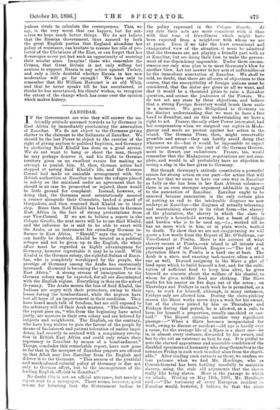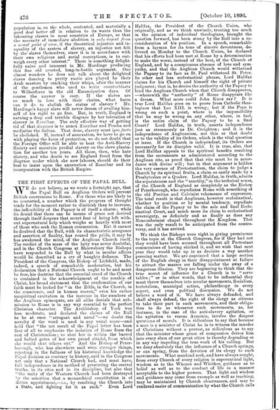ZANZIBAR.
TF the Government are wise they will answer the un- friendly attitude assumed towards us by Germany in East Africa by immediately proclaiming the annexation of Zanzibar. We do not object to the Germans giving shelter to the claimant to the Sultanate of Zanzibar. We should be the last Power to object to the exercise of the right of giving asylum to political fugitives, and Germany by sheltering Said Khalid has done us a good service. We do not want to hang or shoot the man, though he may perhaps deserve it, and his flight to German territory gives us an excellent excuse for making no attempt to punish him. If, then, German action had stopped at saving Said Khalid's life, and the German Consul had made an amicable arrangement with the British authorities at Zanzibar to have the refugee placed in safety on the mainland under an agreement that he should in no ease be prosecuted or injured, there would be little ground for complaint. Instead, however, of doing that, the Germans most ostentatiously moored a. cruiser alongside their Consulate, landed a guard of bluejackets, and then removed Said Khalid on to their ship. Since then Said Khalid has been taken to German East Africa in the face of strong protestations from our Vice-Consul. If we are to believe a report in the Cologne Gazette, the next move will be to use Said Khalid, and the influence he is said to be able to exert with the Arabs, as an instrument for extending German in- fluence in East Africa. " Should," says the report, " as can hardly be doubted, Khalid be treated as a political refugee and not be given up to the English, the whole affair must be regarded as highly advantageous for Germany, however regrettable it may be in itself. With Khalid in the German colony, the rightful Sultan of Zanzi- bar, who is completely worshipped by the people, the prestige of Germany among the Arabs has enormously increased. Germany is becoming the paramount Power in East Africa." A strong stream of immigration to the German colony may be expected, for all are discontented with the English regime. Everything is thus on the side of Germany. The Arabs mourn the loss of Said Khalid, the Indians are angry with their protectors, owing to their losses during the bombardment, while the negroes have lost all hope of an improvement in their condition. They have heard much talk of freedom, but are still exposed to the arbitrary will of their Arab masters. " The Germans," the report goes on, " who from the beginning have acted justly, are masters in their own colony and are beloved by subjects and neighbours. The English, on the contrary, who have long striven to gain the favour of the people by means of backsheesh and patient toleration of native impu- dence, had recently to contend with a sanguinary revolu- tion in British East Africa and could only retain their supremacy in Zanzibar by means of a bombardment." Things, concludes this remarkable report, have now gone so far that in the mosques of Zanzibar prayers are offered up that Allah may free Zanzibar from the English and deliver it to the Germans. " This success of the youthful and much-abused colonial policy of Germany is due not only to German effort, but to the incompetence of the leading English officials in Zanzibar."
• No doubt this is not an official utterance, but merely a report sent to a newspaper. There seems, however, good reason for believing that the Government incline to the policy expressed in the Cologne Gazette. At any rate their acts are more consistent with it than with that tone of friendliness which might have been expected from a neighbour with whom we are at peace. Even if we take the least sensational and exaggerated view of the situation, it must be admitted that the Germans are not playing a friendly part with us at Zanzibar, but are doing their best to make the govern- ment of our dependency impossible. Under these circum- stances our only wise plan is to meet Germany's blow by another blow. Let our answer to her acts of unfriendliness be the immediate annexation of Zanzibar. We shall be told, no doubt, that there are all sorts of objections to this course, that the susceptibility of foreign nations must be considered, that the status quo gives us all we want, and that it would be a thousand pities to raise a Zanzibar question, and arouse the jealousies of the Powers. We do not set any store by these objections, and believe that a strong Foreign Secretary would brush them aside in a moment. We gave Heligoland to Germany on the distinct understanding that we were to have a free hand in Zanzibar, and on this understanding we have a right to act. France, the only other Power interested, had her compensation when we resigned our rights in Mada- gascar and made no protest against her action in the island. The German Press, then, might conceivably grumble and swear—they can hardly avoid doing that whatever we do—but it would be impossible to expect any serious attempt on the part of the German Govern- ment to thwart our endeavours. France, too, would remember that the Madagascar negotiations are not com- plete, and would in all probability have no objection to seeing a slap in the face given to Germany.
But though Germany's attitude constitutes a powerful reason for strong action on our part—for action that will show her that we mean to have our own way in Zanzibar as fully as she has hers in her East African colonies— there is an even stronger argument adducible in regard to the annexation of Zanzibar. Zanzibar ought to be annexed because annexation is the only certain plan of putting an end to the intolerable disgrace we now undergo at Zanzibar—the disgrace of actually tolerating and maintaining slavery in its vilest form—the slavery of the plantation, the slavery in which the slave is not merely a household servant, but a beast of tillage and burden who is to be used up,—i.e., worked till he has no more work in him, or in plain words, worked to death. To show that we are not exaggerating we will quote a few words from the Report of Mr. O'Sullivan, our Vice-Consul at Pemba. Here is his account of what slavery means at Pemba,—an island to all intents and purposes part of the British Empire :—" The lot of a, plantation Slave in Pemba is a hard one at best. The Arab is a stern and exacting task-master, often a cruel one as well. Beyond assigning to the Slave a plot of land upon which to build himself a hut, and for the culti- vation of sufficient food to keep him alive, he gives himself no concern about the welfare of his chattel, to whom he gives neither food nor clothing. The Slave works for his master on five days out of the seven ; on Thursdays and Fridays in each week he is permitted, as a rule, to work for himself, although, in many instances, Fridays only are allowed him. During the clove-picking season the Slave works seven days a week for his owner, but of the cloves picked by him on Thursdays and Fridays during that period, he is allowed, as a rule, to keep for himself a proportion, usually one-third or one- half." The Report contains another very significant passage :—" When a Slave becomes incapacitated for work, owing to disease or accident—old age is hardly ever a cause, for the average life of a Slave is a short one—he is, in almost every instance, discarded by his owner, and has to eke out an existence as best he can. It is pitiful to note the starved appearance and miserable condition of the disabled specimens of humanity who drag themselves to the towns on Friday in each week to solicit alms from the charit- able." After reading such extracts as these, we confess we lose patience when we find Mr. Hardinge, who as Consul-General has been battling manfully to maintain slavery, using the stale old arguments that the slaves really like being slaves. Here is the passage to which we allude. Writing on May 11th, 1895, Mr. Hardinge said :—" The testimony of every European resident in Zanzibar would, however, I believe, be that the slave population is, on the whole, contented, and materially a good deal better off in relation to its wants than the labouring classes in most countries of Europe, so that the necessity of immediate abolition is only urgent from a moral point of view, if the theoretical injustice and in- equality of the system of slavery, an injustice not felt by the slaves themselves, since it is in accordance with their own religious and social conceptions, is to out- weigh every other interest." There is something delight- fully naive and innocent in Mr. Hardinge producing this fine old crusted, long-in-bottle argument. One almost wonders he does not talk about the delighted slaves dancing to pretty rustic airs played by their Arab masters by cracking their whips, after the manner of the gentlemen who used to write counterblasts to Wilberforce in the old Emancipation days. Of course the answer is easy. If the slaves are so much in love with their chains, what harm can it do to abolish the status of slavery ? Mr. Hardinge's happy slave will never dream of availing him- self of his right to go free. But, in truth, England is earning a deep and terrible disgrace by her toleration of slavery in Zanzibar. The only effective way of getting rid of that disgrace is to annex Zanzibar and Pemba and mediatise the Sultan. That done, slavery must ipso facto be abolished. If, instead of annexation, we have to go on with playing the farce of protection, we do not doubt that the Foreign Office will be able to beat the Anti-Slavery Society and maintain predial slavery on the clove planta- tion for another ten years. All those, then, who hate slavery, and who desire to see England freed from the disgrace under which she now labours, should do their best to insist upon the annexation of Zanzibar and its incorporation with the British Empire.



















































 Previous page
Previous page